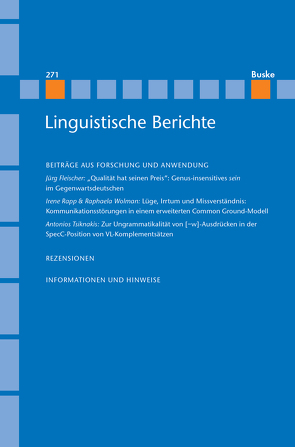
Beiträge aus Forschung und Anwendung
– Jürg Fleischer: „Qualität hat seinen Preis Preis“: Genus-insensitives 'sein' im Gegenwartsdeutschen.
Abstract: The German possessive 'sein' is usually classified as a pronoun of the 3rd person singular masculine and neuter. However, in the grammatical literature some descriptions of 'sein' instead of an expected 3rd person singular feminine possessive pronoun 'ihr' referring to feminine antecedents can be found. Based on search queries in the German Reference Corpus DeReKo it is shown that the phenomenon can be empirically established. While certain collocations displaying a high amount of neuter pronoun antecedents might be favorable for the use of 'sein' (alles [neuter] hat seinen Preis 'everything has its price' > Qualität [feminine] hat seinen Preis 'quality has its price'), it turns out that the semantics of the antecedent is decisive. In most examples, the feminine antecedent is an inanimate noun. This suggests that 'sein' is underlyingly unmarked with respect to gender, while the feminine 'ihr' is primarily a pronoun denoting female sex and only secondarily feminine gender.
– Irene Rapp & Raphaela Wolman: Lüge, Irrtum und Missverständnis: Kommunikation Missverständnis: Kommunikationsstörungen in einem erweiterten Common Ground Ground-Modell.
Abstract: In this paper we will argue that the analysis of lies, fallacies, and misunderstandings requires a complex model including a heterogeneous common ground based on reportative and situational evidence (cf. Farkas & Bruce 2010) and two additional layers, beliefs and objective facts. Lies can be defined by using the concept of reportative evidence, i. e. there is a contrast between an utterance and the utterer’s beliefs. Fallacies arise if a person is mistaken with regard to the situational evidence, i. e. there is a contrast between her beliefs and the objective facts. Misunderstandings, again, refer to reportative evidence, i. e. there is a contrast between the intended meaning of an utterance and the way it is understood by the hearer. Whereas the analysis of lies proves that the common ground is based on evidence and not on mutual belief, the analysis of fallacies and misunderstandings shows that both its situational and its reportative part have to split up into one part that is clearly fixed and another part that is open to interpretation and thus endangered by these communication failures.
– Antonios Tsiknakis: Zur Ungrammatikalität von [−w]-Ausdrücken in der SpecC-Position von VL-Komplementsätzen.
Abstract: This article addresses the impossibility of topicalization in verb final complement clauses in German. In the first part of the paper, existing research dealing with this phenomenon is discussed. Following this, an alternative approach is suggested which is embedded in a general theory of finite verb movement to the left periphery and topicalization in interrogative and declarative clause types. In a nutshell, it will be established that both syntactic processes are trig-gered by respective clause type features whose interpretation leads to an update of the question under discussion or the common ground of the context in prototypical utterance situations. Finally, the paper is concluded with the proposition to treat the feature triggering topicalization as a functor that modifies the interpretation of the feature which is triggering verb movement and therefore presupposes its presence for reasons of interpretability.
Rezensionen
– Melitta Gillmann: Narrog, Heiko & Bernd Heine (2018): Grammaticalization from a typological perspective.
– Jan Kerkmann: Schneider, Christian (2020): Der sprachlose Philosoph. Ludwig Wittgensteins Philosophie als lebensgeschichtliche Selbstreflexion.
Informationen und Hinweise
von Klaus Müllner und den Herausgeber*innen
Aktualisiert: 2023-06-16
> findR *
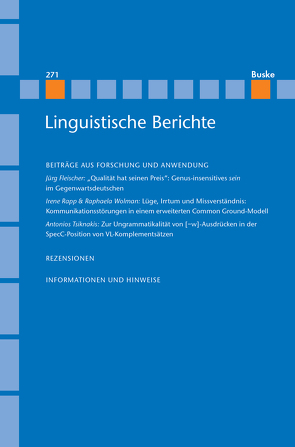
Beiträge aus Forschung und Anwendung
– Jürg Fleischer: „Qualität hat seinen Preis Preis“: Genus-insensitives 'sein' im Gegenwartsdeutschen.
Abstract: The German possessive 'sein' is usually classified as a pronoun of the 3rd person singular masculine and neuter. However, in the grammatical literature some descriptions of 'sein' instead of an expected 3rd person singular feminine possessive pronoun 'ihr' referring to feminine antecedents can be found. Based on search queries in the German Reference Corpus DeReKo it is shown that the phenomenon can be empirically established. While certain collocations displaying a high amount of neuter pronoun antecedents might be favorable for the use of 'sein' (alles [neuter] hat seinen Preis 'everything has its price' > Qualität [feminine] hat seinen Preis 'quality has its price'), it turns out that the semantics of the antecedent is decisive. In most examples, the feminine antecedent is an inanimate noun. This suggests that 'sein' is underlyingly unmarked with respect to gender, while the feminine 'ihr' is primarily a pronoun denoting female sex and only secondarily feminine gender.
– Irene Rapp & Raphaela Wolman: Lüge, Irrtum und Missverständnis: Kommunikation Missverständnis: Kommunikationsstörungen in einem erweiterten Common Ground Ground-Modell.
Abstract: In this paper we will argue that the analysis of lies, fallacies, and misunderstandings requires a complex model including a heterogeneous common ground based on reportative and situational evidence (cf. Farkas & Bruce 2010) and two additional layers, beliefs and objective facts. Lies can be defined by using the concept of reportative evidence, i. e. there is a contrast between an utterance and the utterer’s beliefs. Fallacies arise if a person is mistaken with regard to the situational evidence, i. e. there is a contrast between her beliefs and the objective facts. Misunderstandings, again, refer to reportative evidence, i. e. there is a contrast between the intended meaning of an utterance and the way it is understood by the hearer. Whereas the analysis of lies proves that the common ground is based on evidence and not on mutual belief, the analysis of fallacies and misunderstandings shows that both its situational and its reportative part have to split up into one part that is clearly fixed and another part that is open to interpretation and thus endangered by these communication failures.
– Antonios Tsiknakis: Zur Ungrammatikalität von [−w]-Ausdrücken in der SpecC-Position von VL-Komplementsätzen.
Abstract: This article addresses the impossibility of topicalization in verb final complement clauses in German. In the first part of the paper, existing research dealing with this phenomenon is discussed. Following this, an alternative approach is suggested which is embedded in a general theory of finite verb movement to the left periphery and topicalization in interrogative and declarative clause types. In a nutshell, it will be established that both syntactic processes are trig-gered by respective clause type features whose interpretation leads to an update of the question under discussion or the common ground of the context in prototypical utterance situations. Finally, the paper is concluded with the proposition to treat the feature triggering topicalization as a functor that modifies the interpretation of the feature which is triggering verb movement and therefore presupposes its presence for reasons of interpretability.
Rezensionen
– Melitta Gillmann: Narrog, Heiko & Bernd Heine (2018): Grammaticalization from a typological perspective.
– Jan Kerkmann: Schneider, Christian (2020): Der sprachlose Philosoph. Ludwig Wittgensteins Philosophie als lebensgeschichtliche Selbstreflexion.
Informationen und Hinweise
von Klaus Müllner und den Herausgeber*innen
Aktualisiert: 2023-06-13
> findR *
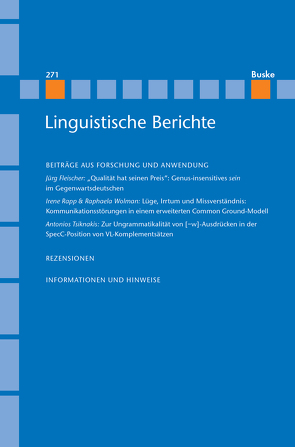
Beiträge aus Forschung und Anwendung
– Jürg Fleischer: „Qualität hat seinen Preis Preis“: Genus-insensitives 'sein' im Gegenwartsdeutschen.
Abstract: The German possessive 'sein' is usually classified as a pronoun of the 3rd person singular masculine and neuter. However, in the grammatical literature some descriptions of 'sein' instead of an expected 3rd person singular feminine possessive pronoun 'ihr' referring to feminine antecedents can be found. Based on search queries in the German Reference Corpus DeReKo it is shown that the phenomenon can be empirically established. While certain collocations displaying a high amount of neuter pronoun antecedents might be favorable for the use of 'sein' (alles [neuter] hat seinen Preis 'everything has its price' > Qualität [feminine] hat seinen Preis 'quality has its price'), it turns out that the semantics of the antecedent is decisive. In most examples, the feminine antecedent is an inanimate noun. This suggests that 'sein' is underlyingly unmarked with respect to gender, while the feminine 'ihr' is primarily a pronoun denoting female sex and only secondarily feminine gender.
– Irene Rapp & Raphaela Wolman: Lüge, Irrtum und Missverständnis: Kommunikation Missverständnis: Kommunikationsstörungen in einem erweiterten Common Ground Ground-Modell.
Abstract: In this paper we will argue that the analysis of lies, fallacies, and misunderstandings requires a complex model including a heterogeneous common ground based on reportative and situational evidence (cf. Farkas & Bruce 2010) and two additional layers, beliefs and objective facts. Lies can be defined by using the concept of reportative evidence, i. e. there is a contrast between an utterance and the utterer’s beliefs. Fallacies arise if a person is mistaken with regard to the situational evidence, i. e. there is a contrast between her beliefs and the objective facts. Misunderstandings, again, refer to reportative evidence, i. e. there is a contrast between the intended meaning of an utterance and the way it is understood by the hearer. Whereas the analysis of lies proves that the common ground is based on evidence and not on mutual belief, the analysis of fallacies and misunderstandings shows that both its situational and its reportative part have to split up into one part that is clearly fixed and another part that is open to interpretation and thus endangered by these communication failures.
– Antonios Tsiknakis: Zur Ungrammatikalität von [−w]-Ausdrücken in der SpecC-Position von VL-Komplementsätzen.
Abstract: This article addresses the impossibility of topicalization in verb final complement clauses in German. In the first part of the paper, existing research dealing with this phenomenon is discussed. Following this, an alternative approach is suggested which is embedded in a general theory of finite verb movement to the left periphery and topicalization in interrogative and declarative clause types. In a nutshell, it will be established that both syntactic processes are trig-gered by respective clause type features whose interpretation leads to an update of the question under discussion or the common ground of the context in prototypical utterance situations. Finally, the paper is concluded with the proposition to treat the feature triggering topicalization as a functor that modifies the interpretation of the feature which is triggering verb movement and therefore presupposes its presence for reasons of interpretability.
Rezensionen
– Melitta Gillmann: Narrog, Heiko & Bernd Heine (2018): Grammaticalization from a typological perspective.
– Jan Kerkmann: Schneider, Christian (2020): Der sprachlose Philosoph. Ludwig Wittgensteins Philosophie als lebensgeschichtliche Selbstreflexion.
Informationen und Hinweise
von Klaus Müllner und den Herausgeber*innen
Aktualisiert: 2023-06-08
> findR *
Aktualisiert: 2023-05-29
> findR *
Aktualisiert: 2023-05-29
> findR *
Aktualisiert: 2023-05-29
> findR *
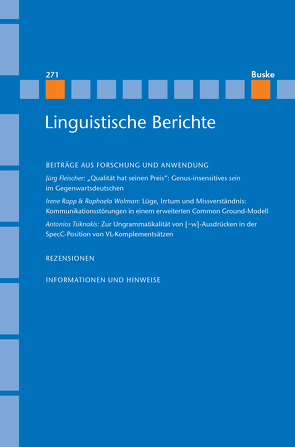
Beiträge aus Forschung und Anwendung
– Jürg Fleischer: „Qualität hat seinen Preis Preis“: Genus-insensitives 'sein' im Gegenwartsdeutschen.
Abstract: The German possessive 'sein' is usually classified as a pronoun of the 3rd person singular masculine and neuter. However, in the grammatical literature some descriptions of 'sein' instead of an expected 3rd person singular feminine possessive pronoun 'ihr' referring to feminine antecedents can be found. Based on search queries in the German Reference Corpus DeReKo it is shown that the phenomenon can be empirically established. While certain collocations displaying a high amount of neuter pronoun antecedents might be favorable for the use of 'sein' (alles [neuter] hat seinen Preis 'everything has its price' > Qualität [feminine] hat seinen Preis 'quality has its price'), it turns out that the semantics of the antecedent is decisive. In most examples, the feminine antecedent is an inanimate noun. This suggests that 'sein' is underlyingly unmarked with respect to gender, while the feminine 'ihr' is primarily a pronoun denoting female sex and only secondarily feminine gender.
– Irene Rapp & Raphaela Wolman: Lüge, Irrtum und Missverständnis: Kommunikation Missverständnis: Kommunikationsstörungen in einem erweiterten Common Ground Ground-Modell.
Abstract: In this paper we will argue that the analysis of lies, fallacies, and misunderstandings requires a complex model including a heterogeneous common ground based on reportative and situational evidence (cf. Farkas & Bruce 2010) and two additional layers, beliefs and objective facts. Lies can be defined by using the concept of reportative evidence, i. e. there is a contrast between an utterance and the utterer’s beliefs. Fallacies arise if a person is mistaken with regard to the situational evidence, i. e. there is a contrast between her beliefs and the objective facts. Misunderstandings, again, refer to reportative evidence, i. e. there is a contrast between the intended meaning of an utterance and the way it is understood by the hearer. Whereas the analysis of lies proves that the common ground is based on evidence and not on mutual belief, the analysis of fallacies and misunderstandings shows that both its situational and its reportative part have to split up into one part that is clearly fixed and another part that is open to interpretation and thus endangered by these communication failures.
– Antonios Tsiknakis: Zur Ungrammatikalität von [−w]-Ausdrücken in der SpecC-Position von VL-Komplementsätzen.
Abstract: This article addresses the impossibility of topicalization in verb final complement clauses in German. In the first part of the paper, existing research dealing with this phenomenon is discussed. Following this, an alternative approach is suggested which is embedded in a general theory of finite verb movement to the left periphery and topicalization in interrogative and declarative clause types. In a nutshell, it will be established that both syntactic processes are trig-gered by respective clause type features whose interpretation leads to an update of the question under discussion or the common ground of the context in prototypical utterance situations. Finally, the paper is concluded with the proposition to treat the feature triggering topicalization as a functor that modifies the interpretation of the feature which is triggering verb movement and therefore presupposes its presence for reasons of interpretability.
Rezensionen
– Melitta Gillmann: Narrog, Heiko & Bernd Heine (2018): Grammaticalization from a typological perspective.
– Jan Kerkmann: Schneider, Christian (2020): Der sprachlose Philosoph. Ludwig Wittgensteins Philosophie als lebensgeschichtliche Selbstreflexion.
Informationen und Hinweise
von Klaus Müllner und den Herausgeber*innen
Aktualisiert: 2023-05-26
> findR *
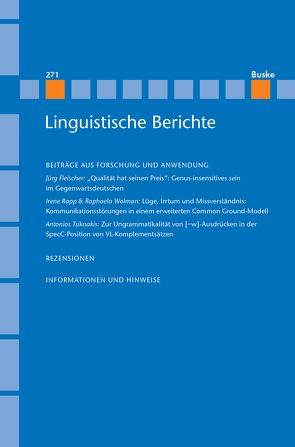
Beiträge aus Forschung und Anwendung
– Jürg Fleischer: „Qualität hat seinen Preis Preis“: Genus-insensitives 'sein' im Gegenwartsdeutschen.
Abstract: The German possessive 'sein' is usually classified as a pronoun of the 3rd person singular masculine and neuter. However, in the grammatical literature some descriptions of 'sein' instead of an expected 3rd person singular feminine possessive pronoun 'ihr' referring to feminine antecedents can be found. Based on search queries in the German Reference Corpus DeReKo it is shown that the phenomenon can be empirically established. While certain collocations displaying a high amount of neuter pronoun antecedents might be favorable for the use of 'sein' (alles [neuter] hat seinen Preis 'everything has its price' > Qualität [feminine] hat seinen Preis 'quality has its price'), it turns out that the semantics of the antecedent is decisive. In most examples, the feminine antecedent is an inanimate noun. This suggests that 'sein' is underlyingly unmarked with respect to gender, while the feminine 'ihr' is primarily a pronoun denoting female sex and only secondarily feminine gender.
– Irene Rapp & Raphaela Wolman: Lüge, Irrtum und Missverständnis: Kommunikation Missverständnis: Kommunikationsstörungen in einem erweiterten Common Ground Ground-Modell.
Abstract: In this paper we will argue that the analysis of lies, fallacies, and misunderstandings requires a complex model including a heterogeneous common ground based on reportative and situational evidence (cf. Farkas & Bruce 2010) and two additional layers, beliefs and objective facts. Lies can be defined by using the concept of reportative evidence, i. e. there is a contrast between an utterance and the utterer’s beliefs. Fallacies arise if a person is mistaken with regard to the situational evidence, i. e. there is a contrast between her beliefs and the objective facts. Misunderstandings, again, refer to reportative evidence, i. e. there is a contrast between the intended meaning of an utterance and the way it is understood by the hearer. Whereas the analysis of lies proves that the common ground is based on evidence and not on mutual belief, the analysis of fallacies and misunderstandings shows that both its situational and its reportative part have to split up into one part that is clearly fixed and another part that is open to interpretation and thus endangered by these communication failures.
– Antonios Tsiknakis: Zur Ungrammatikalität von [−w]-Ausdrücken in der SpecC-Position von VL-Komplementsätzen.
Abstract: This article addresses the impossibility of topicalization in verb final complement clauses in German. In the first part of the paper, existing research dealing with this phenomenon is discussed. Following this, an alternative approach is suggested which is embedded in a general theory of finite verb movement to the left periphery and topicalization in interrogative and declarative clause types. In a nutshell, it will be established that both syntactic processes are trig-gered by respective clause type features whose interpretation leads to an update of the question under discussion or the common ground of the context in prototypical utterance situations. Finally, the paper is concluded with the proposition to treat the feature triggering topicalization as a functor that modifies the interpretation of the feature which is triggering verb movement and therefore presupposes its presence for reasons of interpretability.
Rezensionen
– Melitta Gillmann: Narrog, Heiko & Bernd Heine (2018): Grammaticalization from a typological perspective.
– Jan Kerkmann: Schneider, Christian (2020): Der sprachlose Philosoph. Ludwig Wittgensteins Philosophie als lebensgeschichtliche Selbstreflexion.
Informationen und Hinweise
von Klaus Müllner und den Herausgeber*innen
Aktualisiert: 2023-05-23
> findR *
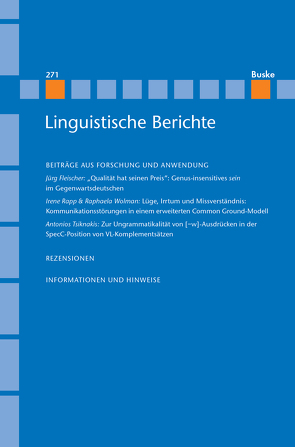
Beiträge aus Forschung und Anwendung
– Jürg Fleischer: „Qualität hat seinen Preis Preis“: Genus-insensitives 'sein' im Gegenwartsdeutschen.
Abstract: The German possessive 'sein' is usually classified as a pronoun of the 3rd person singular masculine and neuter. However, in the grammatical literature some descriptions of 'sein' instead of an expected 3rd person singular feminine possessive pronoun 'ihr' referring to feminine antecedents can be found. Based on search queries in the German Reference Corpus DeReKo it is shown that the phenomenon can be empirically established. While certain collocations displaying a high amount of neuter pronoun antecedents might be favorable for the use of 'sein' (alles [neuter] hat seinen Preis 'everything has its price' > Qualität [feminine] hat seinen Preis 'quality has its price'), it turns out that the semantics of the antecedent is decisive. In most examples, the feminine antecedent is an inanimate noun. This suggests that 'sein' is underlyingly unmarked with respect to gender, while the feminine 'ihr' is primarily a pronoun denoting female sex and only secondarily feminine gender.
– Irene Rapp & Raphaela Wolman: Lüge, Irrtum und Missverständnis: Kommunikation Missverständnis: Kommunikationsstörungen in einem erweiterten Common Ground Ground-Modell.
Abstract: In this paper we will argue that the analysis of lies, fallacies, and misunderstandings requires a complex model including a heterogeneous common ground based on reportative and situational evidence (cf. Farkas & Bruce 2010) and two additional layers, beliefs and objective facts. Lies can be defined by using the concept of reportative evidence, i. e. there is a contrast between an utterance and the utterer’s beliefs. Fallacies arise if a person is mistaken with regard to the situational evidence, i. e. there is a contrast between her beliefs and the objective facts. Misunderstandings, again, refer to reportative evidence, i. e. there is a contrast between the intended meaning of an utterance and the way it is understood by the hearer. Whereas the analysis of lies proves that the common ground is based on evidence and not on mutual belief, the analysis of fallacies and misunderstandings shows that both its situational and its reportative part have to split up into one part that is clearly fixed and another part that is open to interpretation and thus endangered by these communication failures.
– Antonios Tsiknakis: Zur Ungrammatikalität von [−w]-Ausdrücken in der SpecC-Position von VL-Komplementsätzen.
Abstract: This article addresses the impossibility of topicalization in verb final complement clauses in German. In the first part of the paper, existing research dealing with this phenomenon is discussed. Following this, an alternative approach is suggested which is embedded in a general theory of finite verb movement to the left periphery and topicalization in interrogative and declarative clause types. In a nutshell, it will be established that both syntactic processes are trig-gered by respective clause type features whose interpretation leads to an update of the question under discussion or the common ground of the context in prototypical utterance situations. Finally, the paper is concluded with the proposition to treat the feature triggering topicalization as a functor that modifies the interpretation of the feature which is triggering verb movement and therefore presupposes its presence for reasons of interpretability.
Rezensionen
– Melitta Gillmann: Narrog, Heiko & Bernd Heine (2018): Grammaticalization from a typological perspective.
– Jan Kerkmann: Schneider, Christian (2020): Der sprachlose Philosoph. Ludwig Wittgensteins Philosophie als lebensgeschichtliche Selbstreflexion.
Informationen und Hinweise
von Klaus Müllner und den Herausgeber*innen
Aktualisiert: 2023-05-22
> findR *
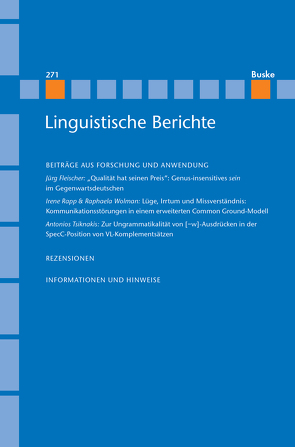
Beiträge aus Forschung und Anwendung
– Jürg Fleischer: „Qualität hat seinen Preis Preis“: Genus-insensitives 'sein' im Gegenwartsdeutschen.
Abstract: The German possessive 'sein' is usually classified as a pronoun of the 3rd person singular masculine and neuter. However, in the grammatical literature some descriptions of 'sein' instead of an expected 3rd person singular feminine possessive pronoun 'ihr' referring to feminine antecedents can be found. Based on search queries in the German Reference Corpus DeReKo it is shown that the phenomenon can be empirically established. While certain collocations displaying a high amount of neuter pronoun antecedents might be favorable for the use of 'sein' (alles [neuter] hat seinen Preis 'everything has its price' > Qualität [feminine] hat seinen Preis 'quality has its price'), it turns out that the semantics of the antecedent is decisive. In most examples, the feminine antecedent is an inanimate noun. This suggests that 'sein' is underlyingly unmarked with respect to gender, while the feminine 'ihr' is primarily a pronoun denoting female sex and only secondarily feminine gender.
– Irene Rapp & Raphaela Wolman: Lüge, Irrtum und Missverständnis: Kommunikation Missverständnis: Kommunikationsstörungen in einem erweiterten Common Ground Ground-Modell.
Abstract: In this paper we will argue that the analysis of lies, fallacies, and misunderstandings requires a complex model including a heterogeneous common ground based on reportative and situational evidence (cf. Farkas & Bruce 2010) and two additional layers, beliefs and objective facts. Lies can be defined by using the concept of reportative evidence, i. e. there is a contrast between an utterance and the utterer’s beliefs. Fallacies arise if a person is mistaken with regard to the situational evidence, i. e. there is a contrast between her beliefs and the objective facts. Misunderstandings, again, refer to reportative evidence, i. e. there is a contrast between the intended meaning of an utterance and the way it is understood by the hearer. Whereas the analysis of lies proves that the common ground is based on evidence and not on mutual belief, the analysis of fallacies and misunderstandings shows that both its situational and its reportative part have to split up into one part that is clearly fixed and another part that is open to interpretation and thus endangered by these communication failures.
– Antonios Tsiknakis: Zur Ungrammatikalität von [−w]-Ausdrücken in der SpecC-Position von VL-Komplementsätzen.
Abstract: This article addresses the impossibility of topicalization in verb final complement clauses in German. In the first part of the paper, existing research dealing with this phenomenon is discussed. Following this, an alternative approach is suggested which is embedded in a general theory of finite verb movement to the left periphery and topicalization in interrogative and declarative clause types. In a nutshell, it will be established that both syntactic processes are trig-gered by respective clause type features whose interpretation leads to an update of the question under discussion or the common ground of the context in prototypical utterance situations. Finally, the paper is concluded with the proposition to treat the feature triggering topicalization as a functor that modifies the interpretation of the feature which is triggering verb movement and therefore presupposes its presence for reasons of interpretability.
Rezensionen
– Melitta Gillmann: Narrog, Heiko & Bernd Heine (2018): Grammaticalization from a typological perspective.
– Jan Kerkmann: Schneider, Christian (2020): Der sprachlose Philosoph. Ludwig Wittgensteins Philosophie als lebensgeschichtliche Selbstreflexion.
Informationen und Hinweise
von Klaus Müllner und den Herausgeber*innen
Aktualisiert: 2023-05-20
> findR *
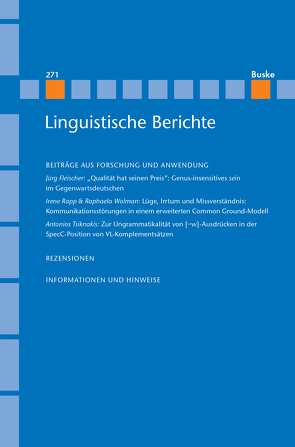
Beiträge aus Forschung und Anwendung
– Jürg Fleischer: „Qualität hat seinen Preis Preis“: Genus-insensitives 'sein' im Gegenwartsdeutschen.
Abstract: The German possessive 'sein' is usually classified as a pronoun of the 3rd person singular masculine and neuter. However, in the grammatical literature some descriptions of 'sein' instead of an expected 3rd person singular feminine possessive pronoun 'ihr' referring to feminine antecedents can be found. Based on search queries in the German Reference Corpus DeReKo it is shown that the phenomenon can be empirically established. While certain collocations displaying a high amount of neuter pronoun antecedents might be favorable for the use of 'sein' (alles [neuter] hat seinen Preis 'everything has its price' > Qualität [feminine] hat seinen Preis 'quality has its price'), it turns out that the semantics of the antecedent is decisive. In most examples, the feminine antecedent is an inanimate noun. This suggests that 'sein' is underlyingly unmarked with respect to gender, while the feminine 'ihr' is primarily a pronoun denoting female sex and only secondarily feminine gender.
– Irene Rapp & Raphaela Wolman: Lüge, Irrtum und Missverständnis: Kommunikation Missverständnis: Kommunikationsstörungen in einem erweiterten Common Ground Ground-Modell.
Abstract: In this paper we will argue that the analysis of lies, fallacies, and misunderstandings requires a complex model including a heterogeneous common ground based on reportative and situational evidence (cf. Farkas & Bruce 2010) and two additional layers, beliefs and objective facts. Lies can be defined by using the concept of reportative evidence, i. e. there is a contrast between an utterance and the utterer’s beliefs. Fallacies arise if a person is mistaken with regard to the situational evidence, i. e. there is a contrast between her beliefs and the objective facts. Misunderstandings, again, refer to reportative evidence, i. e. there is a contrast between the intended meaning of an utterance and the way it is understood by the hearer. Whereas the analysis of lies proves that the common ground is based on evidence and not on mutual belief, the analysis of fallacies and misunderstandings shows that both its situational and its reportative part have to split up into one part that is clearly fixed and another part that is open to interpretation and thus endangered by these communication failures.
– Antonios Tsiknakis: Zur Ungrammatikalität von [−w]-Ausdrücken in der SpecC-Position von VL-Komplementsätzen.
Abstract: This article addresses the impossibility of topicalization in verb final complement clauses in German. In the first part of the paper, existing research dealing with this phenomenon is discussed. Following this, an alternative approach is suggested which is embedded in a general theory of finite verb movement to the left periphery and topicalization in interrogative and declarative clause types. In a nutshell, it will be established that both syntactic processes are trig-gered by respective clause type features whose interpretation leads to an update of the question under discussion or the common ground of the context in prototypical utterance situations. Finally, the paper is concluded with the proposition to treat the feature triggering topicalization as a functor that modifies the interpretation of the feature which is triggering verb movement and therefore presupposes its presence for reasons of interpretability.
Rezensionen
– Melitta Gillmann: Narrog, Heiko & Bernd Heine (2018): Grammaticalization from a typological perspective.
– Jan Kerkmann: Schneider, Christian (2020): Der sprachlose Philosoph. Ludwig Wittgensteins Philosophie als lebensgeschichtliche Selbstreflexion.
Informationen und Hinweise
von Klaus Müllner und den Herausgeber*innen
Aktualisiert: 2023-05-18
> findR *
Aktualisiert: 2023-05-12
> findR *
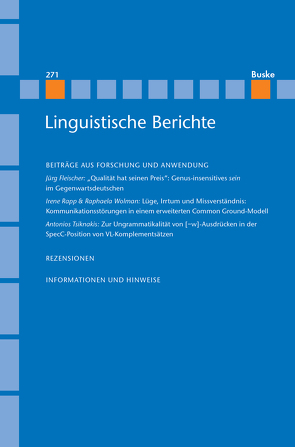
Beiträge aus Forschung und Anwendung
– Jürg Fleischer: „Qualität hat seinen Preis Preis“: Genus-insensitives 'sein' im Gegenwartsdeutschen.
Abstract: The German possessive 'sein' is usually classified as a pronoun of the 3rd person singular masculine and neuter. However, in the grammatical literature some descriptions of 'sein' instead of an expected 3rd person singular feminine possessive pronoun 'ihr' referring to feminine antecedents can be found. Based on search queries in the German Reference Corpus DeReKo it is shown that the phenomenon can be empirically established. While certain collocations displaying a high amount of neuter pronoun antecedents might be favorable for the use of 'sein' (alles [neuter] hat seinen Preis 'everything has its price' > Qualität [feminine] hat seinen Preis 'quality has its price'), it turns out that the semantics of the antecedent is decisive. In most examples, the feminine antecedent is an inanimate noun. This suggests that 'sein' is underlyingly unmarked with respect to gender, while the feminine 'ihr' is primarily a pronoun denoting female sex and only secondarily feminine gender.
– Irene Rapp & Raphaela Wolman: Lüge, Irrtum und Missverständnis: Kommunikation Missverständnis: Kommunikationsstörungen in einem erweiterten Common Ground Ground-Modell.
Abstract: In this paper we will argue that the analysis of lies, fallacies, and misunderstandings requires a complex model including a heterogeneous common ground based on reportative and situational evidence (cf. Farkas & Bruce 2010) and two additional layers, beliefs and objective facts. Lies can be defined by using the concept of reportative evidence, i. e. there is a contrast between an utterance and the utterer’s beliefs. Fallacies arise if a person is mistaken with regard to the situational evidence, i. e. there is a contrast between her beliefs and the objective facts. Misunderstandings, again, refer to reportative evidence, i. e. there is a contrast between the intended meaning of an utterance and the way it is understood by the hearer. Whereas the analysis of lies proves that the common ground is based on evidence and not on mutual belief, the analysis of fallacies and misunderstandings shows that both its situational and its reportative part have to split up into one part that is clearly fixed and another part that is open to interpretation and thus endangered by these communication failures.
– Antonios Tsiknakis: Zur Ungrammatikalität von [−w]-Ausdrücken in der SpecC-Position von VL-Komplementsätzen.
Abstract: This article addresses the impossibility of topicalization in verb final complement clauses in German. In the first part of the paper, existing research dealing with this phenomenon is discussed. Following this, an alternative approach is suggested which is embedded in a general theory of finite verb movement to the left periphery and topicalization in interrogative and declarative clause types. In a nutshell, it will be established that both syntactic processes are trig-gered by respective clause type features whose interpretation leads to an update of the question under discussion or the common ground of the context in prototypical utterance situations. Finally, the paper is concluded with the proposition to treat the feature triggering topicalization as a functor that modifies the interpretation of the feature which is triggering verb movement and therefore presupposes its presence for reasons of interpretability.
Rezensionen
– Melitta Gillmann: Narrog, Heiko & Bernd Heine (2018): Grammaticalization from a typological perspective.
– Jan Kerkmann: Schneider, Christian (2020): Der sprachlose Philosoph. Ludwig Wittgensteins Philosophie als lebensgeschichtliche Selbstreflexion.
Informationen und Hinweise
von Klaus Müllner und den Herausgeber*innen
Aktualisiert: 2023-05-12
> findR *
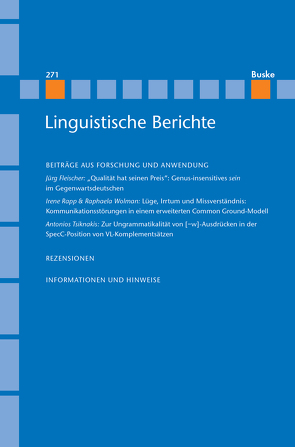
Beiträge aus Forschung und Anwendung
– Jürg Fleischer: „Qualität hat seinen Preis Preis“: Genus-insensitives 'sein' im Gegenwartsdeutschen.
Abstract: The German possessive 'sein' is usually classified as a pronoun of the 3rd person singular masculine and neuter. However, in the grammatical literature some descriptions of 'sein' instead of an expected 3rd person singular feminine possessive pronoun 'ihr' referring to feminine antecedents can be found. Based on search queries in the German Reference Corpus DeReKo it is shown that the phenomenon can be empirically established. While certain collocations displaying a high amount of neuter pronoun antecedents might be favorable for the use of 'sein' (alles [neuter] hat seinen Preis 'everything has its price' > Qualität [feminine] hat seinen Preis 'quality has its price'), it turns out that the semantics of the antecedent is decisive. In most examples, the feminine antecedent is an inanimate noun. This suggests that 'sein' is underlyingly unmarked with respect to gender, while the feminine 'ihr' is primarily a pronoun denoting female sex and only secondarily feminine gender.
– Irene Rapp & Raphaela Wolman: Lüge, Irrtum und Missverständnis: Kommunikation Missverständnis: Kommunikationsstörungen in einem erweiterten Common Ground Ground-Modell.
Abstract: In this paper we will argue that the analysis of lies, fallacies, and misunderstandings requires a complex model including a heterogeneous common ground based on reportative and situational evidence (cf. Farkas & Bruce 2010) and two additional layers, beliefs and objective facts. Lies can be defined by using the concept of reportative evidence, i. e. there is a contrast between an utterance and the utterer’s beliefs. Fallacies arise if a person is mistaken with regard to the situational evidence, i. e. there is a contrast between her beliefs and the objective facts. Misunderstandings, again, refer to reportative evidence, i. e. there is a contrast between the intended meaning of an utterance and the way it is understood by the hearer. Whereas the analysis of lies proves that the common ground is based on evidence and not on mutual belief, the analysis of fallacies and misunderstandings shows that both its situational and its reportative part have to split up into one part that is clearly fixed and another part that is open to interpretation and thus endangered by these communication failures.
– Antonios Tsiknakis: Zur Ungrammatikalität von [−w]-Ausdrücken in der SpecC-Position von VL-Komplementsätzen.
Abstract: This article addresses the impossibility of topicalization in verb final complement clauses in German. In the first part of the paper, existing research dealing with this phenomenon is discussed. Following this, an alternative approach is suggested which is embedded in a general theory of finite verb movement to the left periphery and topicalization in interrogative and declarative clause types. In a nutshell, it will be established that both syntactic processes are trig-gered by respective clause type features whose interpretation leads to an update of the question under discussion or the common ground of the context in prototypical utterance situations. Finally, the paper is concluded with the proposition to treat the feature triggering topicalization as a functor that modifies the interpretation of the feature which is triggering verb movement and therefore presupposes its presence for reasons of interpretability.
Rezensionen
– Melitta Gillmann: Narrog, Heiko & Bernd Heine (2018): Grammaticalization from a typological perspective.
– Jan Kerkmann: Schneider, Christian (2020): Der sprachlose Philosoph. Ludwig Wittgensteins Philosophie als lebensgeschichtliche Selbstreflexion.
Informationen und Hinweise
von Klaus Müllner und den Herausgeber*innen
Aktualisiert: 2023-04-26
> findR *
Aktualisiert: 2023-04-27
> findR *
Aktualisiert: 2023-03-30
> findR *
Aktualisiert: 2023-03-30
> findR *
MEHR ANZEIGEN
Bücher von Tsiknakis, Antonios
Sie suchen ein Buch oder Publikation vonTsiknakis, Antonios ? Bei Buch findr finden Sie alle Bücher Tsiknakis, Antonios.
Entdecken Sie neue Bücher oder Klassiker für Sie selbst oder zum Verschenken. Buch findr hat zahlreiche Bücher
von Tsiknakis, Antonios im Sortiment. Nehmen Sie sich Zeit zum Stöbern und finden Sie das passende Buch oder die
Publiketion für Ihr Lesevergnügen oder Ihr Interessensgebiet. Stöbern Sie durch unser Angebot und finden Sie aus
unserer großen Auswahl das Buch, das Ihnen zusagt. Bei Buch findr finden Sie Romane, Ratgeber, wissenschaftliche und
populärwissenschaftliche Bücher uvm. Bestellen Sie Ihr Buch zu Ihrem Thema einfach online und lassen Sie es sich
bequem nach Hause schicken. Wir wünschen Ihnen schöne und entspannte Lesemomente mit Ihrem Buch
von Tsiknakis, Antonios .
Tsiknakis, Antonios - Große Auswahl an Publikationen bei Buch findr
Bei uns finden Sie Bücher aller beliebter Autoren, Neuerscheinungen, Bestseller genauso wie alte Schätze. Bücher
von Tsiknakis, Antonios die Ihre Fantasie anregen und Bücher, die Sie weiterbilden und Ihnen wissenschaftliche Fakten
vermitteln. Ganz nach Ihrem Geschmack ist das passende Buch für Sie dabei. Finden Sie eine große Auswahl Bücher
verschiedenster Genres, Verlage, Schlagworte Genre bei Buchfindr:
Unser Repertoire umfasst Bücher von
- Tsikrikas, Dimitrios
- Tsikrikas, Zenon
- Tsilikis, Dimitrios
- Tsilimandou, Marina
- Tsiliotis, Charalambos
- Tsimba, Valéry
- Tsimbaev, Konstantin
- Tsimochawa, Rita
- Tsimopoulos, Dimitrios
- Tsimoshchanka, Yuliya
Sie haben viele Möglichkeiten bei Buch findr die passenden Bücher für Ihr Lesevergnügen zu entdecken. Nutzen Sie
unsere Suchfunktionen, um zu stöbern und für Sie interessante Bücher in den unterschiedlichen Genres und Kategorien
zu finden. Neben Büchern von Tsiknakis, Antonios und Büchern aus verschiedenen Kategorien finden Sie schnell und
einfach auch eine Auflistung thematisch passender Publikationen. Probieren Sie es aus, legen Sie jetzt los! Ihrem
Lesevergnügen steht nichts im Wege. Nutzen Sie die Vorteile Ihre Bücher online zu kaufen und bekommen Sie die
bestellten Bücher schnell und bequem zugestellt. Nehmen Sie sich die Zeit, online die Bücher Ihrer Wahl anzulesen,
Buchempfehlungen und Rezensionen zu studieren, Informationen zu Autoren zu lesen. Viel Spaß beim Lesen wünscht Ihnen
das Team von Buchfindr.



![Linke Satzperipherie und [±wh]-Asymmetrie von Tsiknakis, Antonios](https://buch-findr.de/media/linke-satzperipherie-und-%25c2%25b1wh-asymmetrie-tsiknakis-antonios-3_9783110666298_295.jpg)
![Linke Satzperipherie und [±wh]-Asymmetrie von Tsiknakis, Antonios](https://buch-findr.de/media/linke-satzperipherie-und-%25c2%25b1wh-asymmetrie-tsiknakis-antonios-hardcover_9783110666014_295.jpg)
![Linke Satzperipherie und [±wh]-Asymmetrie von Tsiknakis, Antonios](https://buch-findr.de/media/linke-satzperipherie-und-%25c2%25b1wh-asymmetrie-tsiknakis-antonios-2_9783110666403_295.jpg)





![Linke Satzperipherie und [±wh]-Asymmetrie von Tsiknakis, Antonios](https://buch-findr.de/media/linke-satzperipherie-und-%25c2%25b1wh-asymmetrie-tsiknakis-antonios_9783110666403_295.jpg)


![Linke Satzperipherie und [±wh]-Asymmetrie von Tsiknakis, Antonios](https://buch-findr.de/media/%25c2%25b1wh-asymmetrie-und-linke-satzperipherie-3_9783110666403_295.jpg)
![Linke Satzperipherie und [±wh]-Asymmetrie von Tsiknakis, Antonios](https://buch-findr.de/media/%25c2%25b1wh-asymmetrie-und-linke-satzperipherie-2_9783110666298_295.jpg)
![Linke Satzperipherie und [±wh]-Asymmetrie von Tsiknakis, Antonios](https://buch-findr.de/media/%25c2%25b1wh-asymmetrie-und-linke-satzperipherie_9783110666014_295.jpg)